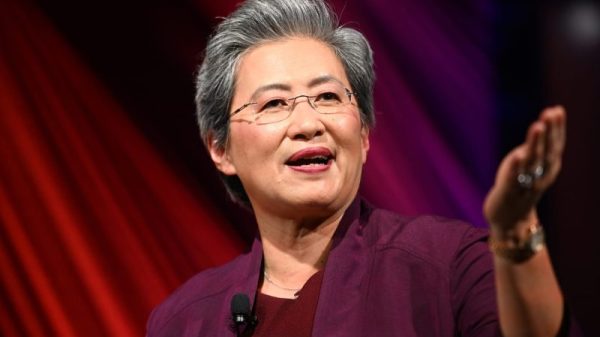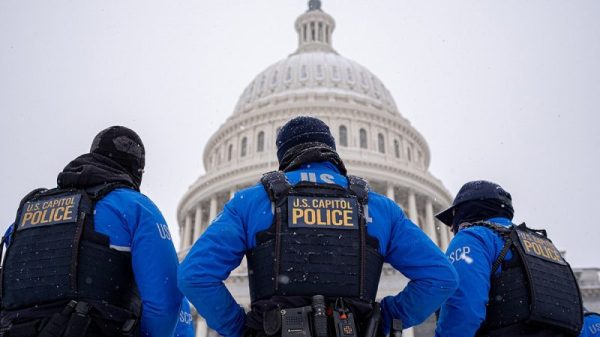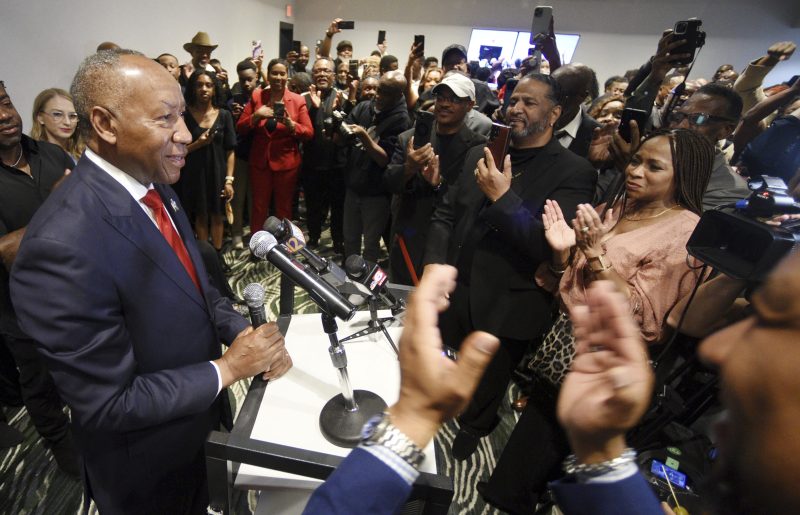SHREVEPORT, La. — In this parish where family roots and political loyalties hold strong, just like the live oaks along the banks of the Red River, many people can’t remember the last time they had a competitive sheriff’s race. So when Sheriff Steve Prator announced last summer that he would step down after more than four decades in law enforcement, residents braced for a divisive campaign.
Yet few could have predicted that they’d have to go to the polls three times in six months to pick a successor — elections fraught with racial tensions and legal wrangling over voting rights that mirror national struggles.
On Saturday, with the sky finally clear after days of rain, voters turned out once more to decide between the two men on ballot after ballot since October: Democrat Henry Whitehorn, a Black 40-year law enforcement veteran, who won the first election by a single vote; and Republican John Nickelson, 44, a White attorney and former city council member with no law enforcement experience but Prator’s endorsement.
Whitehorn’s seeming victory last fall was initially upheld by a recount, then voided by state courts after Nickelson alleged illegal voting. By now, the protracted showdown has divided U.S. House Speaker Mike Johnson’s hometown and the surrounding parish of about 226,000, which is split almost evenly between Black and White people, Democrats and Republicans.
Regardless of political affiliation, locals say they’re disillusioned, distrustful and frustrated.
“People deserve to have a voice,” said Charis McCrady, 28, a Black Democrat and instructor at the Belbo Beauty Institute, which hosted a get-out-the-vote event Friday. “We live in a time when people want to hide the truth.”
Caddo Parish has a history of racial violence dating back to reconstruction. Scores of lynchings earned it the ominous nickname “Bloody Caddo.” In 2022, a commissioner tried to remove a suspected “lynching tree” outside the courthouse, where the Confederate flag flew until 2011.
Black residents had to sue to end segregated buses, schools and libraries. Civil rights protesters were attacked and beaten by police. When Sam Cooke came to town to perform in 1963, he was barred by a hotel because he was Black, arrested and jailed in what would become the inspiration for his anthem of the era, “A Change Is Gonna Come.”
“There is certainly a racial tenor to all politics in Shreveport,” local activist Omari Ho-Sang said.
When the ballots were counted after the first election last October, Nickelson was ahead by several thousand votes but shy of winning the required majority. That prompted the first runoff.
When that runoff was held the following month, the 43,241 votes were tallied and Whitehorn came out on top — by one vote.
That’s when the trouble really started.
The sheriff’s race devolved into a tangle of accusations, litigation, court intervention and pitched, months-long acrimony. Two people — both Republicans — were found to have voted twice. A subsequent recount left Whitehorn the winner. Nickelson, alleging voter fraud, sued both his opponent and the Louisiana secretary of state. Ultimately, state courts threw out the runoff results and called for another election.
Louisiana Democratic Party Chair Katie Bernhardt blasted the legal fight, saying it had sent the parish “back to a world reminiscent of Jim Crow, a world of exclusion, control and violent inequality.”
Nickelson had a sharp response: “Racially divisive nonsense like this is why the Louisiana Democratic Party is on its deathbed.”
A state appeals court ultimately ruled against Whitehorn, a decision that pitted three White Republican judges against two Black Democrat colleagues. The state Supreme Court refused to hear the case, dividing similarly along political lines. Its chief justice, John Weimer, dissented and alluded to the bigger issues raised by election challenges nationally.
“Only under extreme circumstances, timely and adequately proven, should the vote of the people be overturned by a judicial decree,” wrote Weimer, an Independent. “Otherwise, the measured and peaceful transition of authority, which is a hallmark of our system of democracy, can be unduly delayed and interrupted.”
In the lead-up to the third election, political analysts said it wasn’t clear who would prevail. Early-voter numbers were 61 percent higher than those of the Nov. 18 runoff, with 12,972 Democrats and 8,631 Republicans casting ballots. White voters were outpacing Black counterparts.
“It’s very, very close,” said Pearson Cross, a political science professor at the nearby University of Louisiana Monroe. “Everything depends on turnout, and a few votes either way could make a difference.”
Suspicions over election fraud could motivate conservatives, though their skepticism about Louisiana’s paperless, touch-screen voting machines isn’t new, noted Jeffrey Sadow, an associate professor of political science at Louisiana State University in Shreveport.
“The fact that you can’t audit the machines has got people worried about security,” Sadow said. Yet he saw an advantage for Whitehorn in mobilizing supporters. “He can go back and say we got cheated in this contest, don’t let your voice be silenced.”
This month, many business owners were urging customers to vote. So were relatives and neighbors. Mila Ramirez, a 32-year-old unaffiliated voter, was ready. She cast an early ballot, remembering stories her late grandmother, who was Black, told her about being barred from voting during Jim Crow.
“Everywhere I go I ask young people, ‘Are you going to vote?’ They have no idea about Whitehorn, about the injustice that’s going on,” said Ramirez, who owns a beauty salon. “Especially as Black people, you have to fight for your rights.”
Nonpartisan canvassers from Black Voters Matter and the Urban League of Louisiana distributed fliers encouraging participation. There were complaints about tactics from both candidates’ camps. Caddo Mama Bears, a conservative Facebook group, posted photos of Urban League fliers with Nickelson’s name misspelled. Whitehorn supporters said Nickelson’s wife, PTA president at their children’s public school, was emailing members to support him.
Candy Peavy, 73, made phone calls for Nickelson and recruited other volunteers after attending court hearings in his cases. The retired physical therapist, who is White, calls herself an Independent conservative; she got involved in politics after the 2020 presidential election, which she believes Donald Trump won.
“I’ve been following all the election integrity issues around the country,” said Peavy, and she even testified before a local election commission and the state legislature. “Right now, it’s whoever cheats the best wins. And that’s not a democracy.”
At a strip mall in the middle-class Broadmoor neighborhood, Democrat Mark Dorris admitted he hadn’t voted in the last runoff. Dorris, manager of a discount clothing store, knew some of his friends didn’t vote, either.
“I’m going to damn sure vote in this one because of the outcome last time,” said Dorris, 47, who is Black. “It’s messed up. They want it to be one-sided. All we can do is go vote. It’s a shame something like this has to happen for folks to go out and do what we should have the first time.”
Along thoroughfares like Youree Drive, named after a Confederate officer, a mix of Nickelson and Whitehorn signs competed for space. Nickelson signs dominated amid the historic mansions lining Fairfield Avenue, built by captains of industry in the early 20th century in a mix of styles from Beaux-Arts to Gothic, Romanesque to Tudor.
“If Whitehorn wins, I’m leaving. I’m really troubled,” said Janie Lipscomb, 78, a retired dental hygienist who is White and described herself as fiscally conservative but socially liberal. She doesn’t trust Whitehorn, believing he didn’t manage the city’s finances properly when he worked as its chief administrative officer during the pandemic.
“Once we practice to deceive, it’s a way of life,” she said. “It is evil to deceive people.”
Nickelson, accompanied by Prator at some campaign appearances, continued to defend his legal battle.
“I did what my opponent would have done if the shoe was on the other foot,” he said in an interview. “The outcome of the legal challenges was a victory for election integrity. We have to have processes in place to ensure unlawfully cast votes are not counted, and we accomplished that.”
Whitehorn hadn’t given ground. “We know we won the election. But we’re prepared to win it again,” he told The Washington Post.
He reflected on racism he faced when he started his career with the Louisiana state police, opportunities he missed “because they said I didn’t have the experience, I didn’t have the necessary education.” He later earned his bachelor’s and master’s while working and attended the FBI National Academy and the executive program at Harvard’s Kennedy School of Government.
A final day of door-knocking Saturday was uneventful. After polls closed at 8 p.m., the candidates gathered with supporters at dueling watch parties near the downtown riverfront. The vote tally was slow, leaving the crowd at Whitehorn’s packed event on edge.
About 10:20, results suddenly appeared on television and a roar went up in the room. Whitehorn had won the election-day vote, 21,147 to 18,800. Less than an hour later, even with absentee-vote totals still to be released, Nickelson conceded.
The DJ played “A Change Is Gonna Come.” A triumphant Whitehorn gave his victory speech.
“The citizens have spoken,” he said. “I don’t know what the final results are, but I know it’s more than one vote.”
For the first time in history, Caddo Parish had elected a Black sheriff.
An earlier version of this article said Mila Ramirez was a Democrat. She is an unaffiliated voter. The article has been corrected.







































